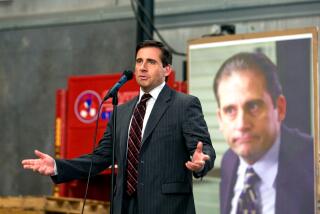Stop! Read All This! Clip It Neatly! File It Carefully! Do It Now! : Management: Like it or not, this guru will get you organized. You’ll need a big trash can, though.
- Share via
WASHINGTON — Bernie Rooney is the ultimate organization man.
His shoes shine. His suit, tie and shirt look crisp. His personal calendar and office calendar, which always are at his fingertips, are penciled in perfectly and don’t have messy scraps of paper and business cards falling out of them.
He is on time. When he gives a seminar, he hands out neat yellow name cards. His reference materials are lined up tidily in front of him. A small, unobtrusive clock that he sets before him keeps him on schedule.
He is enough to drive the average white-collar worker, who is a disorganized mess, crazy.
Rooney is with the paper police. As chief financial officer and a trainer for the Institute for Business Technology, a consulting firm that promises to increase white-collar productivity by getting people to organize themselves and their work, he has forced hundreds of Washington area office workers, managers and executives to do the unthinkable: Throw out their paper, reports, loose-leaf notebooks, memos, yellow stickums, ancient phone messages, useless magazines and dusty old issues of the company’s revised employee handbook.
He has gotten them to stop ignoring their voice mail and return phone messages immediately. They have stopped putting off big projects and now use the “salami technique,” taking a small bite out of them every day. Their desks have three trays on them: “In,” “Out” and “Pending.” The “In” tray is not overflowing with mail from three weeks ago.
They now have a file system that separates work into three categories: working files, research files and archives, which are removed from the office. The super-organized set up what Rooney calls “tickler” files to remind themselves of what they have to do that day. They set up “action plans” to persuade themselves that they will live by Rooney’s rules of neatness and cleanliness.
And, those who become true disciples of IBT’s personal efficiency program, or PEP, learn to scour their desks clean to the point where they have only one thing in front of them to work on. Their mantra is “Do It Now.” Instead of putting off things that they hate to do, they “Do the Worst First.”
“Reorganization isn’t the purpose of the program,” said Rooney. “We come in to get you focused on your job. But you can’t do it if you are disorganized.”
Improving the productivity of office workers is one of the truly important but difficult challenges confronting business. Although productivity--hourly output per worker--has declined throughout the business sector since the early 1970s, the slump in the service sector has been worse than in manufacturing. Boosting the efficiency and productivity of “knowledge” workers in an information-age office is a lot harder than for assembly workers in a production plant.
To attack this problem, IBT charges $4,000 to put seven people through its PEP program, which includes a seminar, an office cleaning and follow-up visits to make sure what has been learned is applied. Then IBT comes back for surprise visits that span a year.
“The whole goal of the program is to get you to be more efficient with the least amount of effort,” Rooney said.
Marketing the Personal Efficiency Program has been relatively simple. IBT, which was founded in 1983 in Stockholm by marketing consultant Kerry Gleeson, plays on guilt and workplace truisms such as “Are you always short of time?” or “Do you work extra hours to catch up on what you don’t do during normal hours?” and “Do you have too much to do?”
IBT promises that once a hanging-file system and a decent desk calendar become part of its employees’ work lives, companies can achieve bigger objectives such as improving quality, offering better customer service, reducing costs or weathering a reorganization.
“This is to get people to produce, not teach time management,” said Gleeson, who thinks his technique will do for white-collar workers what assembly lines have done for the blue-collar world.
IBT, which has $3.25 million in sales and has put 200,000 people through the program in Europe, came to the United States two years ago. Gleeson hopes to franchise his idea beyond the offices he has already opened in Washington, Boston and Boca Raton, Fla.
“The vast majority of managers and middle managers haven’t the foggiest idea about how to work,” said Gleeson, confiding that the secret to his success has been getting others to work.
Washington, despite the federal Paperwork Reduction Act, looked like a natural.
“We noticed a definite need in Washington,” said IBT’s Rooney. “It’s a work-driven environment. Everybody is crisis-oriented.”
This morning at 8:30 sharp, Rooney has seven victims from Contel ASC in Rockville, Md., a provider of data communication networks, sequestered in a sunny conference room for the kickoff two-hour seminar and video.
He lets them in on a few secrets, like 80% of your work is in 20% of your files. He promises that file drawers that now are stuffed too full to open will be half empty by the time he gets through with them by the end of the day.
PEP participants are relieved of their regular duties for the day, and are advised not to take or make phone calls. Their bosses have been told not to bother them. Management has been advised to stock the supply room with plenty of trash cans and hanging file folders.
They don’t know what is about to happen to them.
“Does anyone know what they are in for today?” Rooney asks with a smile. “We’re known as desk busters. You’re going to do it and I assist. Or if you don’t do it, I do it for you.”
It’s the ultimate in the invasion of workplace privacy. This is not like other time-management or executive-organization seminars where someone politely suggests that the key to being more productive at work is to make lists and delegate.
This is Rooney doing hands-on housecleaning of desk drawers, files and offices. This is Rooney checking back not once, but several times, to make sure you have straightened out your work space, that you plan ahead and that you set goals.
He acts like your friend, but he really is your mom.
About 11 a.m. he gets down to business in the small, somewhat claustrophobic office of financial analyst Vicki Hatfield.
Hatfield, one of 72 Contel employees who have gone through PEP training, was voted as having the messiest office. She came prepared in blue jeans to fight overflowing files and the messes left by her predecessor in the job.
Hatfield already uses three trays. She has a calendar, a Rolodex and a stapler. Not much is stuck up on the bulletin board. Then Rooney pulls out her top left drawer.
“What are all these?” he asks quietly.
“All the materials from my quality training,” Hatfield says, looking guilty.
Rooney pulls a Spiegel catalogue out of the drawer. “Don’t keep anything horizontal in a small drawer,” he says, dropping the catalogue in the trash can.
He turns to the top drawer of her desk. “That’s not bad. Everything is contained,” he mumbles, automatically disentangling binder clips, paper clips and rubber bands that are jumbled together.
He starts pulling out files. “The point is to get everything out,” he says, creating a mountain of manila folders on Hatfield’s desk that begins to fall over and spill out paper.
Hatfield looks pained. “I’m normally a very organized person,” she says.
At 11:30, it’s over, at least until after lunch.
“Don’t dump your file cabinets until I get back,” Rooney instructs on his way out to another mess down the hall.
Rooney keeps asking each employee, “How do you feel so far?” as if he is guarding against nervous breakdowns.
He warns them not to go to extremes on their first day because in his fight against procrastination and paper overload, Rooney has seen it all. One Washington executive had IBT in for a marketing presentation. His office was spotless. Not a thing out of place on his desk. Rooney and Ira Chaleff, managing partner for the Washington office, wondered why someone with such a neat office needed them.
Then the executive took them down the hall to his real office, revealing that he was a closet slob.
The key to IBT’s success, says founder Gleeson, is that people are not left to face their messes alone. They get someone like Rooney to spend time with them, trying to figure out why they put reading material in their briefcases and then never read it. Or why they keep dozens of interoffice envelopes stuffed into bottom drawers. Or why they can’t ever part with anything.
“If I clean my office out it won’t look like I do anything,” said Contel treasury assistant Michele Brice, coming up with one of the classic excuses.
Rooney, who considers himself a sort of personal trainer in efficiency, has observed that if people are left to their own devices, no more than 40% “initiate action when I tell them to get in there (and clean it up).”
Rooney said about 75% of the people who go through the program get some benefit. The most basic pay-back is saving time: You save eight full days over a year if you pick up just 15 minutes a day at work that you wasted in meaningless actions such as picking up the same piece of paper 10 times before you act on it--which is the average.
“They brought some organization to the madness,” said Thomas Veystrk, vice president of human resources for Jos. A. Bank Clothiers in Baltimore, which put 10 of its top managers, including the company’s president, through the PEP program recently.
The hope was that managers would use their time more effectively and be able to juggle a number of projects at one time without losing control.
Contel brought in IBT to help with a reorganization in its finance department and to complement an in-house program that stresses improving quality.
“People are better able to plan and set priorities,” said Margaret Brady, Contel vice president of finance. “As we bring new people into the company, we get them trained. It’s only effective if everyone talks the same language.”
And the language is fairly simple. It boils down to three little words that can transform you from a person who has piles of files on your desk to one who has working files, research files and archives.
“Do It Now,” said Rooney.
More to Read
Inside the business of entertainment
The Wide Shot brings you news, analysis and insights on everything from streaming wars to production — and what it all means for the future.
You may occasionally receive promotional content from the Los Angeles Times.









